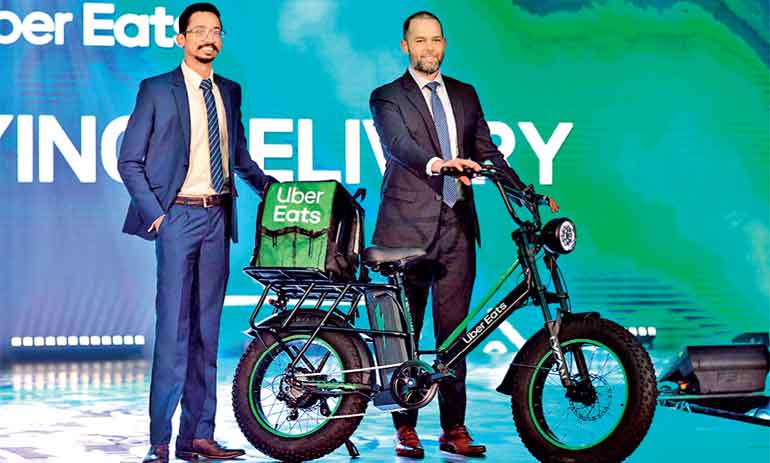Saturday Feb 07, 2026
Saturday Feb 07, 2026
Thursday, 20 April 2023 00:07 - - {{hitsCtrl.values.hits}}

By Darshana Abayasingha
UBER aims to become completely emissions free by 2040, and the company has launched a range of initiatives to achieve its objective around the globe. Part of this program includes shifting deliveries to electric and other renewable sources, and this initiative is already under way in many parts of the world including Sri Lanka.
Speaking to the Daily FT, UBER’s Senior Director of Public Policy and Government Relations Mike Orgill, said this process began in Sri Lanka during the fuel crisis where partners were given the opportunity to do deliveries on bicycles.
“We realised there’s an opportunity, but there are limitations on how far people are willing to go and the range they have. So, we also realised there’s a nice sweet spot in these electric bicycles, and what we are doing is giving away a hundred of these light electric cycles to some of our couriers, and hopefully this will kickstart more interest from people,” he said.
Orgill said Uber is working out ways to advance this platform, and noted there is still a long way to go but the momentum is good. UBER is pushing hard on electric deliveries and working with partners around the world to get electric two-wheelers, three-wheelers and even four-wheelers available for anybody driving to do deliveries. Uber India announced recently it is helping drivers procure 25,000 Tata e-cars, which offers a lot of promise and momentum, he added.
Is it slow? Not so much. The battery attached to the e-bike gives riders some extra boost, and in a place like Colombo where density is high, e-bikes help couriers work efficiently and cost effectively, UBER officials say. Bicycles offer a different radius to motorcycles and different efficiencies, therefore riders are able to identify what orders to pick via the app. Cycles are offered shorter deliveries via the system, and thereon e-bikes and motorbikes with incentives based on location and even elevation.
“The focus is on Colombo for now, this is because the area has got the density. But certainly, we would love to expand to other cities that we cover. So, this is our starting point. One of the cool things about the partnership we are doing with Lumala is obviously we have purchased these bikes we are giving away. But we will also offer discounts for people who want to procure e-bikes to ride with us and also purchase spare parts. So hopefully this is a kick-starting mechanism for the expansion process,” said Orgill.
In terms of its global footprint, UBER says Northern Europe is leading the way in its transition to electric and renewable energy, and adoption is high by a large number of users. Scandinavia and the UK have pursued EVs in a concerted and aggressive fashion, fuelled by supportive policy and stringent standards on emissions.
“We try to play our part as well. But what it really comes down to is each country moving aggressively in the right direction. It’s almost a team sport. You’ve got to be able to manufacture or procure the bikes, and then you must have the charging infrastructure to make it viable in a right policy environment that leads you to a place where the total cost of ownership of an EV is cheaper or on par with an internal combustion engine. Countries that have figured out that ecosystem are the ones that are successful so far,” Orgill added.
Commenting on Sri Lanka and its potential transition, Orgill said right now the availability of options is still limited in this region. Second is they must become affordable and unfortunately electric vehicles are at times seen as a luxury given the costs. Third entails charging infrastructure, and the Government needs to figure out how to incentivise and facilitate the set-up of charging access points and remove barriers to entry and adoption, stating that: “Governments must figure out how you want to spend your dollars on this particular transition. And not every country has tons of money to throw around at this so it must think of tax credits or other types of fiscal measures to close that gap between internal combustion engines and electric vehicles. All those things have to come together.”
He concluded that: “We sort of understand where the world is going on this and we can be either behind the curve or a bit ahead of the curve. From our perspective it’s way better to be ahead of the curve on any kind of technology transformation.
“We are not going to turn around tomorrow and say that every bike or every car has got to be an electric vehicle. Obviously, that’s not pragmatic. But at the same time if we can play a role in this transition, and we absolutely should, that’s why we try to do things like this to incentivise the momentum in the area.”
Uber adds it wants to empower Sri Lankan enterprises to manufacture EVs here, which would provide a boost to the ecosystem in Sri Lanka and help reduce import and maintenance costs. With this effort all regions in Sri Lanka can work towards sustainable mobility, the company added.